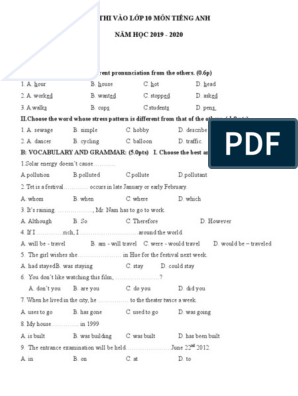0% found this document useful (0 votes)
6 views9 pagesĐề Thi Tuyển Sinh Lớp 10 Môn Tiếng Anh (1, 2)
Uploaded by
vi tranCopyright
© © All Rights Reserved
We take content rights seriously. If you suspect this is your content, claim it here.
Available Formats
Download as DOCX, PDF, TXT or read online on Scribd
0% found this document useful (0 votes)
6 views9 pagesĐề Thi Tuyển Sinh Lớp 10 Môn Tiếng Anh (1, 2)
Uploaded by
vi tranCopyright
© © All Rights Reserved
We take content rights seriously. If you suspect this is your content, claim it here.
Available Formats
Download as DOCX, PDF, TXT or read online on Scribd
/ 9



















































































